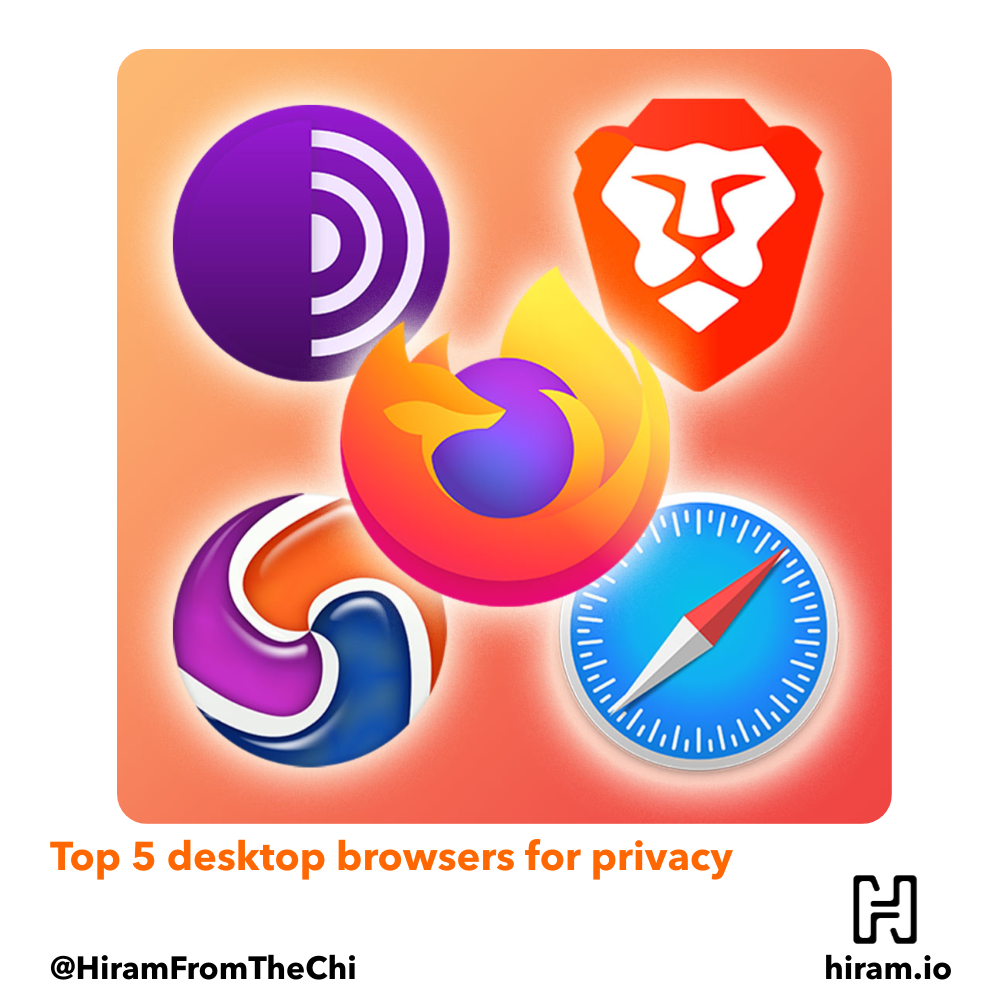Your data and information have, without question, become the most valuable commodity there is. It’s the reason why Google and Facebook are worth $750 billion and $500 billion, respectively. They’re in the data harvesting and advertising business, and they are absolutely killing it in doing so.
Slowly but surely, people are realizing just how valuable their information is. They are beginning to realize that there’s no such thing as “free” online, and that if something claims to be “free," it just means that you’re the product and you are paying for that product with your information.
We generate tons of data every day, mainly because we’re so connected all the time. If we’re not on our computers, we’re on our phones. If we’re not on our phones, we’re on our smart TVs, cameras, and an endless network of devices all connected to the internet. And everything we do online, even if deleted, is never truly gone forever.
Every website visit, gesture, zoom, follow, and everything else is uniquely encapsulated into a digital fingerprint that is sold to third parties and used to track you all over the web whether you like it or not.
There are many steps you can take to minimize your digital footprint and start taking back your online privacy. Let’s start with what you use to access the web in the first place: Your web browser.
Here are the top 5 browsers for the privacy-conscious:
5. Safari
Safari initially started out almost as Mac’s version of Internet Explorer. Nobody asked for it, nobody wanted to use it, and it was essentially the prepackaged browser that you would use for the sole purpose of downloading another browser.
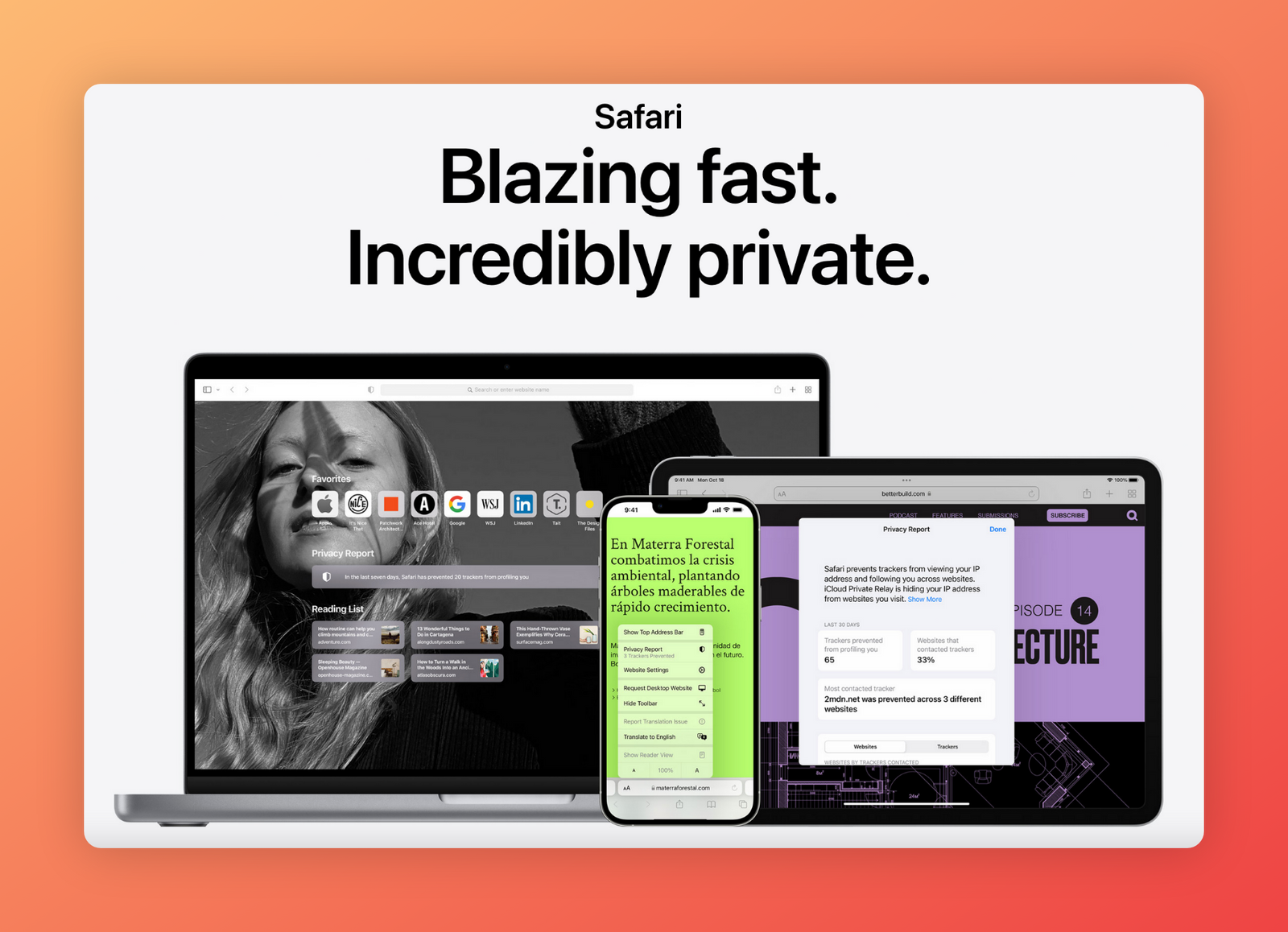
However, Safari has become a very solid browser as Apple has begun to shift towards a more privacy-oriented brand.
Here are a few key features that Safari has to offer:
- Enhanced anti-fingerprinting protections: This makes it harder for advertisers and others to track you through your browser actions.
- Stops third-party websites from dropping data into your cache by default: Many browsers use this technique to figure out where you've been.
- Sign in with Apple: Safari will come integrated with this sign in feature announced this summer by Apple, which will help mask your email.
- Prevent cross-site tracking: Visiting a website leaves cookies and cache that can be used to find you on another website later on.
- Disable JavaScript: This is not unique to Safari, but it's still a useful feature if you need to use it. Malicious code can be injected into webpages using JavaScript, so disabling it could be helpful ion certain pages.
Note: Disabling JavaScript (on any browser) can cause many websites to break and display information oddly.
Download Safari here: https://support.apple.com/downloads/safari
4. Epic
Epic is probably one of the least-known browsers out there, but it really shouldn’t be. Design-wise, it’s almost a Google Chrome clone because it’s based on Chromium. Chromium is an open-source browser project that forms the basis for the Chrome web browser, without all of the proprietary Google components. Think of it as a de-Googled Chrome.
Privacy always comes at the expense of convenience, and Epic is no different. By default, Epic does not use auto-suggest, autofill forms, store history, or save passwords (no passwords should ever be stored in a browser, anyway). So if you’re used to using any of these features, Epic may not be right for you. It may, however, be the best browser with a prepackaged privacy bundle that you can trust to keep you private online.
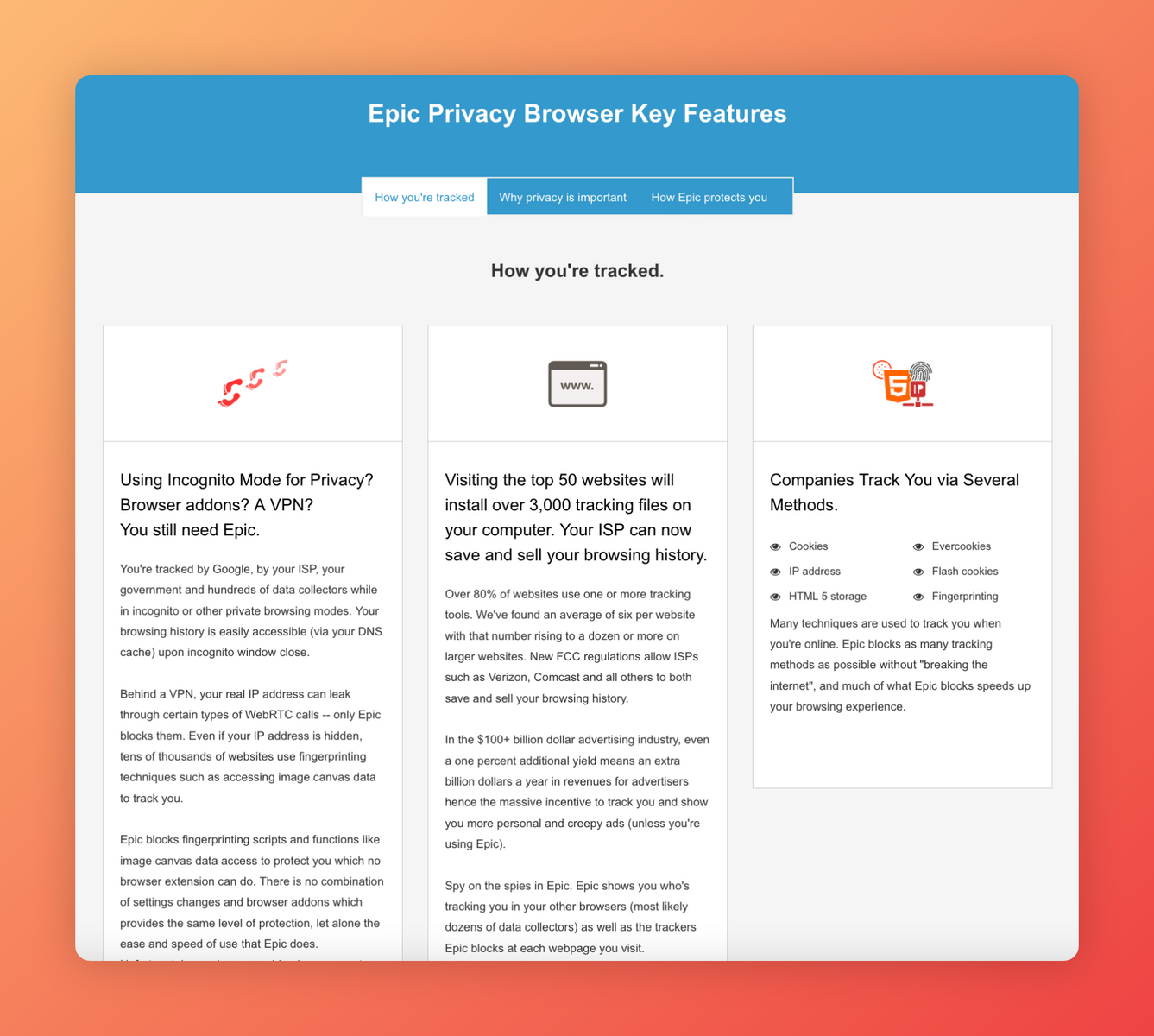
One of Epic’s most distinguished benefits is that it comes with a one-click encrypted proxy, effectively serving as a free built-in VPN. Though it’s still recommended to have a separate VPN running across your network rather than just your browser, it’s a useful tool for those who don’t have a VPN yet. Plus, there’s no harm in having Epic’s proxy turned on in addition to a separate VPN on your computer.
Key features of Epic privacy browser:
- Built-in protection against: Tracking scripts, tracking cookies & other tracking agents, ad networks, cryptocurrency mining scripts (such as Coinhive), dangerous malvertising, and third-party widgets.
- No URL check or URL trackers.
- Do Not Track signal that actually works: DNT was simply a request, but not something websites had to follow. Epic takes a step further by not only requesting, but enforcing the request.
- Always-on private browsing mode that deletes history, cache, cookies, data, and more on exit: This means every session you start is a completely new one.
- Fingerprinting protection: In addition to blocking image canvases, Epic blocks ultrasound signals which are sent from websites to be picked up by your mobile phone in order to coordinate tracking.
Note: Although Epic does a lot to prevent fingerprinting, the argument can be made that using Epic can actually make your fingerprint more unique. This is because Epic does not hold a large market share in web browsers. Think about it this way: If only 100 users use Epic, and you are one of them, there is a 1/100 chance that the person or organization tracking you know who you are because it’s a small sample size of people using Epic. If you were to use a browser with a higher market share, it means your fingerprint is less unique because there are more users like you using similar settings. This is inevitably a chicken-and-egg situation where in order to make Epic more effective in the fingerprinting aspect, more users need to adopt and use Epic.
Download Epic privacy browser here: https://www.epicbrowser.com/index.html
3. Brave
Another Chromium-based product, Brave makes its mission clear right on the homepage: You are not a product. Design-wise, I would call it a blend of Chrome and Firefox. In general, Brave is a very simple and easy-to-use browser. If you’re coming over from Chrome, you’ll find a lot of the same features, such as autofill, profiles, permissions, etc. Everything will feel native right away.
Brave’s best feature is probably its speed. It is by far the fastest browser I have ever used, and it’s not even close. This is in large part due to the Brave team removing a lot of elements that tend to slow web pages down. If your main concern is speed when it comes to browsing, you’ll love Brave.
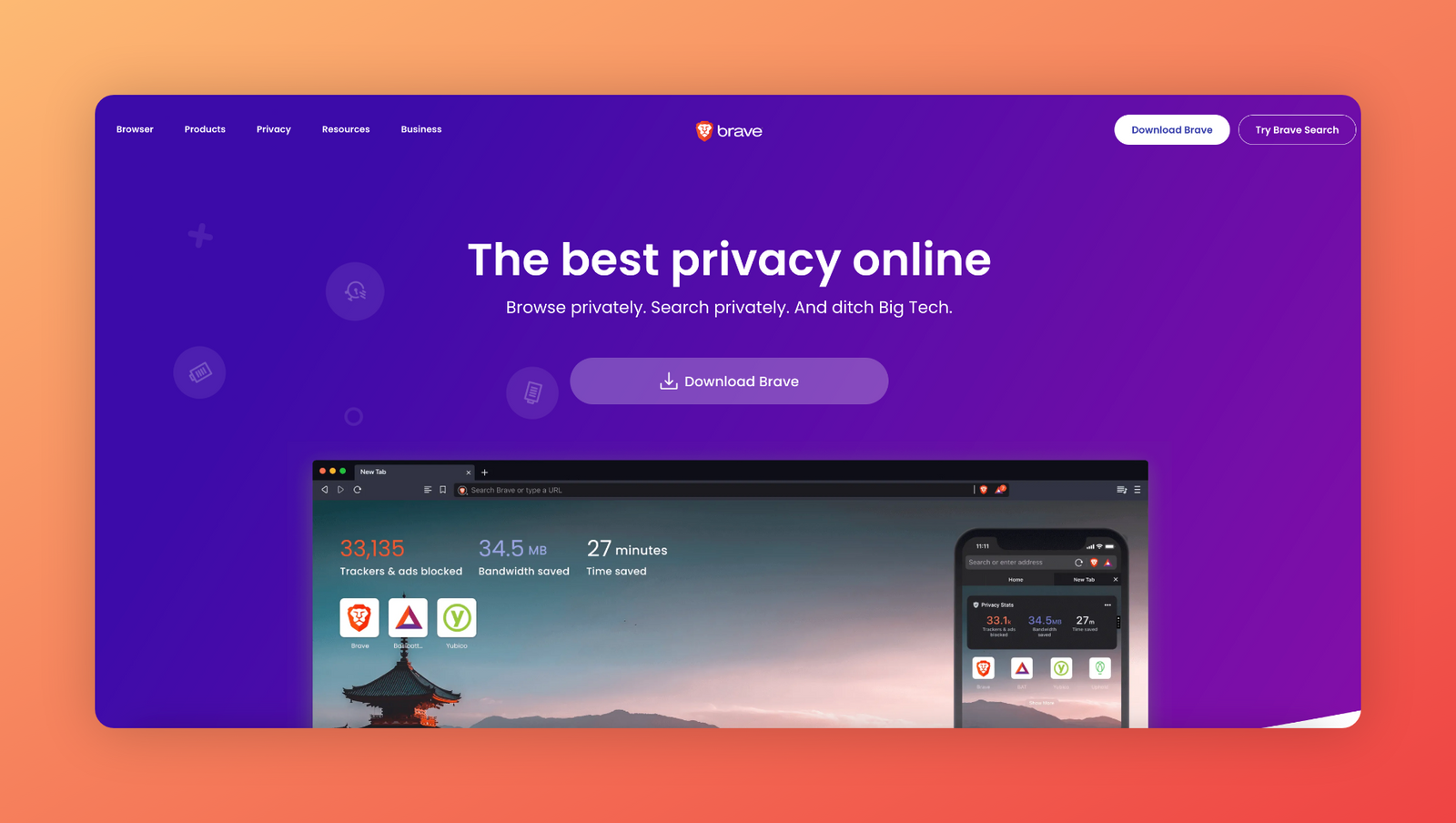
Brave’s most unique feature is the “Brave Shields.” The Brave Shields sits on the top right of the browser, to the right of the URL bar. Here, you can not only see but also configure, everything that is currently on the web page you’re on.
They are categorized into 5 main areas:
- Third-party trackers
- Connections upgraded to HTTPS
- Scripts
- Third-party cookies
- Third-party device recognition
At the click of a switch, you can choose to block or allow these as you like. This is particularly useful for those who wish to be more privacy-conscious but don’t feel comfortable getting deep into the configuration of the browser yet. The switches are also very useful because they allow you to toggle one variable at a time if the page you’re on has some broken elements.
As I mentioned earlier, blocking certain scripts can make websites act weird. However, it’s not an all-or-nothing solution. Instead, you can toggle allowing scripts, all while still blocking trackers and fingerprinting methods.
Another really interesting feature that Brave has is “Brave Rewards.” Brave Rewards allow you to earn by viewing privacy-respecting ads and paying it forward to support content creators. This approach is unique to Brave, compared to Chrome where you are literally tracked inside out and constantly advertised to. It also doesn’t fall on the other end of the spectrum like Epic and Firefox in terms of ads, where all ads are extinguished no matter what. Brave’s method of rewarding both the advertisers and the users could prove to be a viable middle ground in the future of marketing.
Key features of Brave:
- Fast, due to the number of trackers it blocks
- Easy to toggle switches
- Emphasis on usability
- Rewards ad viewers and content creators
- Removes bloatware
Download Brave here: https://brave.com/
2. Tor
Tor has been around for almost two decades now and is based on Firefox. Tor hides your activity and identity online by passing your data through a number of relays throughout the Tor network. Similar to Epic, your cookies, cache, and history are deleted on exit.
However, it is not the clearing of cookies or history that makes it so private, it’s the function of the relays because it makes you so hard to track.
Many use Tor to access the dark web, though you should be warned that the dark web can be extremely dangerous if you’re not careful. In fact, accessing the dark web will likely place you on a government list of suspicious individuals. This isn’t to say you’ve committed a crime simply by using Tor or anything like that, but because there are illicit dealings on the dark web (which can only be accessed through the Tor network), governments and undercover entities often monitor and lurk in the dark web.
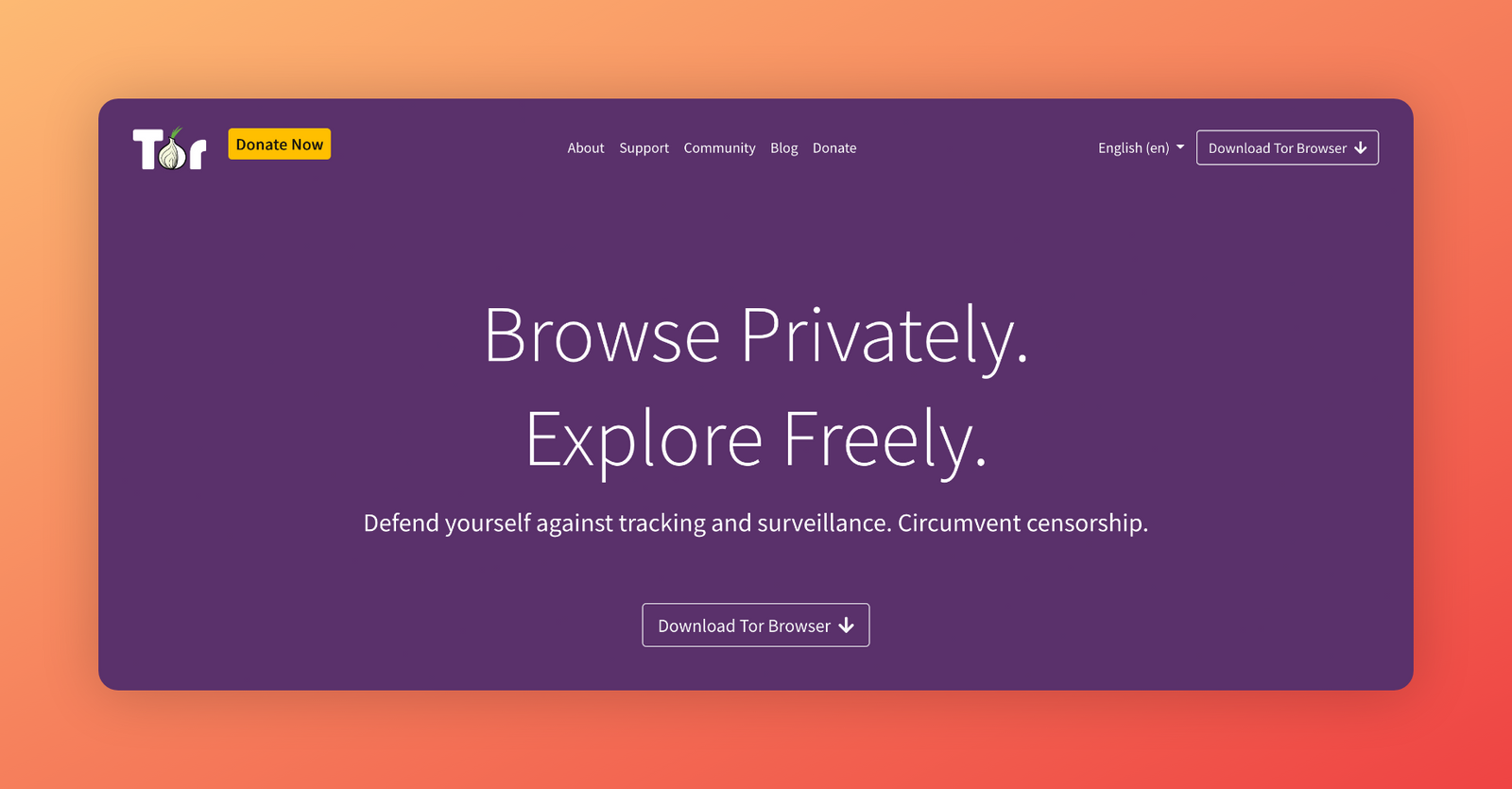
Needless to say, this isn’t a particularly mainstream browser — but it’s not supposed to be. It is, however, arguably the most private way to access the internet. The only reason it falls to number two on this list is because of its lack of mainstream appeal.
That’s not to say regular people can’t (or shouldn’t) use it, though. It usually is portrayed in more abstract ways because of the drug and arms trade that goes on in the dark web, but there are other use cases for it too. Journalists, people under oppressive governments, whistleblowers, high-profile individuals, the military, and many others all use Tor.

Key features of Tor:
- Protects your data and identity online
- Widely used network
- Ability to access the dark web
- Slower browsing than you may be accustomed to (because of the relays that preserve your privacy)
You can download Tor here: https://www.torproject.org/download/
1. Firefox
If there was ever an organization doing more for the online privacy and security of the consumer, it would probably be named Mozilla. Firefox continues to be at the top of the browser game in terms of putting control back into your hands. A free and open source browser, Firefox is fully customizable from the inside out all while still maintaining usability. Choose themes, set your preferences, and more.
The reason I mention usability is because it’s a huge determining factor in gaining mainstream adoption — something that Epic or Tor might not be well-suited for. This is because not everyone will be able to nor want to devote the time to learning the ins and outs of their browser. Maybe some, and hopefully a lot, but the fact of the matter is that a lot of people will just open a browser and start surfing the web. So it’s good that it has the capacity to be adjusted to specific settings, but even if it’s not configured in a specific way, it still takes lots of preventative measures towards protecting your privacy online.
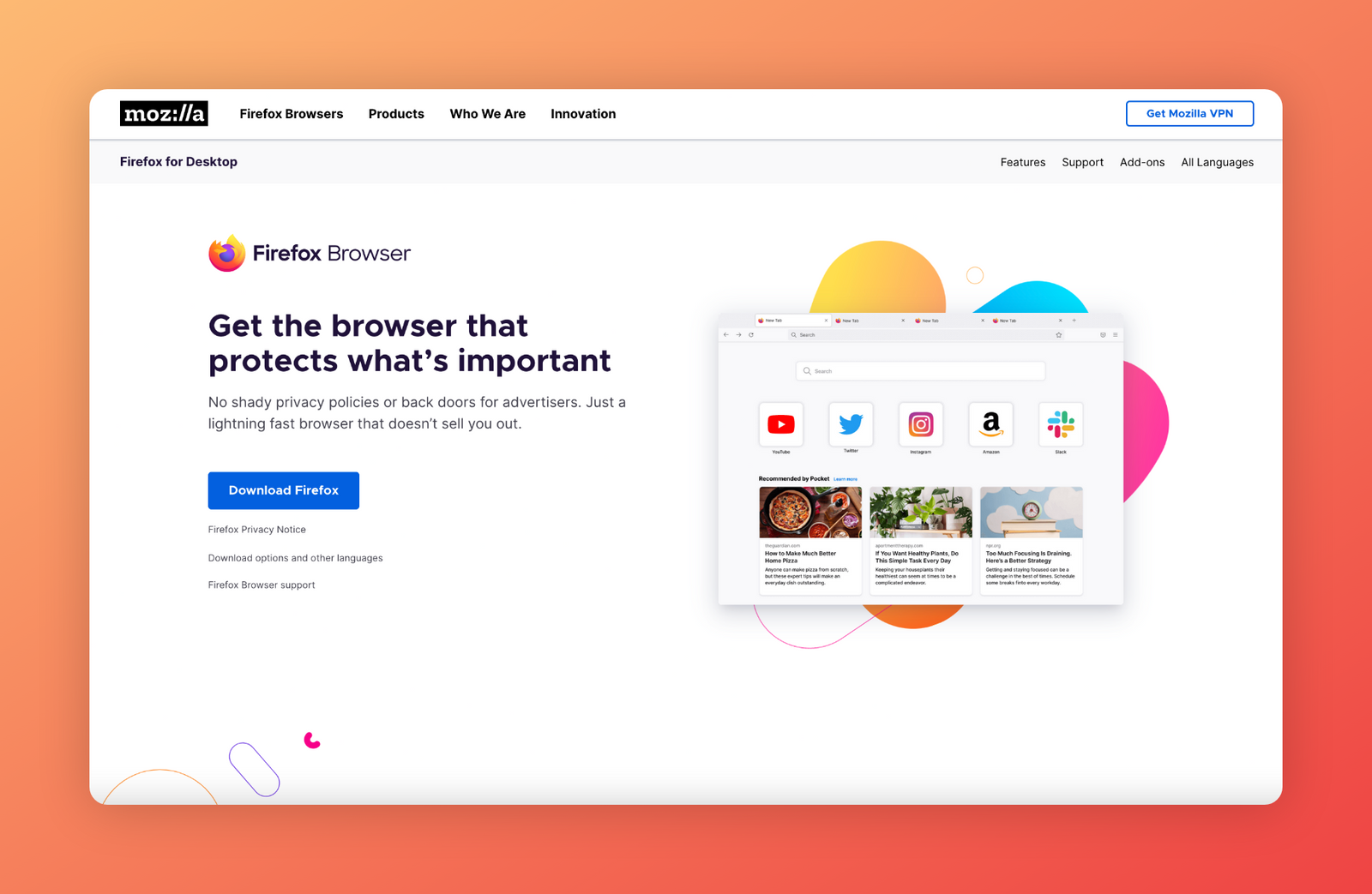
Where Chrome has Extensions, Firefox has Add-Ons. There are thousands of free add-ons created by developers all over the world that you can install to personalize your Firefox browsing experience. Some of the most popular amongst privacy enthusiasts are HTTPS Everywhere, uBlock Origin, Decentraleyes, and Privacy Badger.
However, there is an endless amount of add-ons, ranging from shopping, productivity, multimedia, ad blockers, and more. I would highly recommend checking out the add-on marketplace and finding out what you’ve been missing in your browser life.
One great thing about Firefox is its built-in “Containers” functionality. This serves to keep your online life separate, meaning you can do banking on one tab, shopping in another, and work on the next. Each tab acts as a separate session with its own settings so that you are not cross-tracked.
Key features of Firefox:
- Free and open-source: You can go into its source code and make sure there aren’t tracking scripts or malicious code written into its underlying architecture
- Content blocking: Removes tracking across all the content you come across
- Integration capabilities with other privacy-respecting Mozilla products: Important to blend privacy and security with convenience
- Fully customizable: Tailor it to meet your needs
- Bookmarks and settings can sync across devices
Download Firefox here: https://www.mozilla.org/en-US/firefox/new/
Are there any other browsers that have our best interests in mind? Would love to hear about it. Reach out and let me know:
- Web: hiram.io
- Rising Tide (blog): hiram.io/blog
- LinkedIn: @hiramfromthechi
- Twitter/X: @hiramfromthechi
- Medium: @hiramfromthechi
- Mastodon: @hiramfromthechi@mastodon.social

